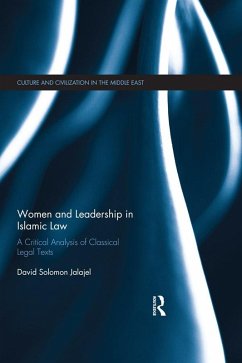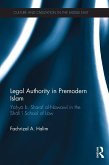Islamic law has traditionally prohibited women from being prayer leaders and heads of state. This book examines the assumption within much existing scholarship that the patriarchal nature of pre-Islamic and early Muslim Near Eastern Society is the main reason for this. It claims that the evolution of Islamic law was a complex process, shaped by numerous cultural, historical and political factors, as well as scriptural sources whose importance cannot be dismissed. The book examines a broad survey of legal works from the four canonical Sunni schools of law to determine what factors influenced the development of the legal rulings prohibiting women from assuming leadership roles.
Dieser Download kann aus rechtlichen Gründen nur mit Rechnungsadresse in A, B, BG, CY, CZ, D, DK, EW, E, FIN, F, GR, HR, H, IRL, I, LT, L, LR, M, NL, PL, P, R, S, SLO, SK ausgeliefert werden.









